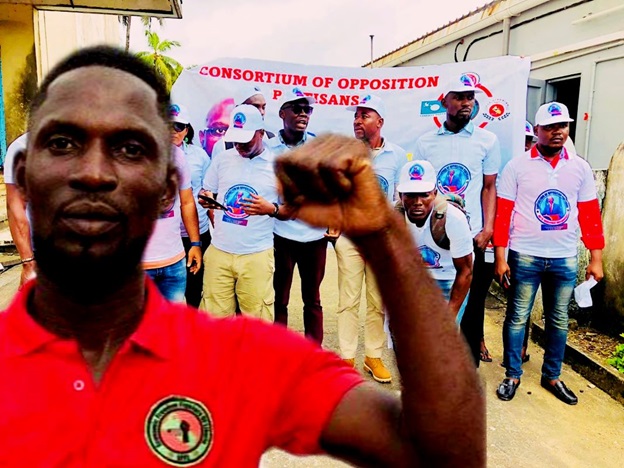MONROVIA – Extraditing someone without due process is generally considered unlawful. Due process is a fundamental principle of law that guarantees fair treatment and safeguards the rights of individuals involved in legal proceedings. Extradition, the procedure for transferring a criminal suspect or convicted individual from one jurisdiction to another, usually entails intricate legal protocols. As Liberian Journalist, Lyndon J. Ponnie, reports, the National Human Rights Commission of Liberia has expressed dismay of how the Government of Liberia handled the extradition of alleged Sierra Leonean dissident, Mohammed Toure, otherwise called Yeate Yeate.
Toure was arrested Friday by Liberian Police at the request of President Julius Maada Bio of Sierra Leone. The Sierra Leonean government had accused the suspect and others of planning to overthrow the government.
Toure has been in Liberia since 2002 and according to the government of Sierra Leone, it is here in Liberia, that Toure allegedly coordinated the plot. They also said, he has been in Liberia and has been allegedly supported by a Liberian senator, Sarr Halie Joseph of Montserrado County.
The Sierra Leonean Government disclosed that the suspect has been seen in the convoy of the Montserrado County senator. It was based on intelligence gathered by Sierra Leone that it used Interpol to deliver a writ of arrest for Toure.
Interestingly though, while government prosecutors were starting to investigate the request, the Liberian government issued a statement indicating they have decided to remove the suspect from Liberia. But the question is, did the government satisfy best practices and gave the suspect due process?
Different countries have their own laws and extradition treaties that govern the process of extradition. These laws and treaties often outline the specific requirements and procedures that must be followed to extradite an individual. Typically, an extradition request involves the submission of evidence and legal arguments to support the request, followed by a judicial review to determine whether the requested individual should be extradited.
Extradition without due process would violate the principles of fairness, human rights, and the rule of law. If an extradition process is conducted in violation of due process rights, it can be challenged in court, and the courts may refuse to grant the extradition request or order the release of the individual if they have already been extradited.
The recent arrest of Mohamed Toure, an alleged Sierra Leonean dissident, in Monrovia has sparked a contentious debate over whether the Liberian government should have ever extradited him to Sierra Leone in the first place without due process.
The chair of the National Human Rights Commission, Cllr. Dempster Browne thinks the Liberian Government did not meet the Minimum standard that resulted in Toure’s removal from the Country.
Cllr. Browne said Liberia has no extradition treaty with Sierra Leone. He further told newsmen at the Temple of Justice in Monrovia today that the Liberian government should have exercise caution and consider the principles of individual rights and national sovereignty before making a decision on Toure’s extradition.
It is crucial to examine the context of a previous extradition request made by Liberia and rejected by Sierra Leone, involving talk show host Henry Costa, to highlight the need for consistency and fairness in extradition cases, Cllr. Browne said.
Preserving Individual Rights:
Extradition should not be treated as a mere administrative process but rather as a mechanism that directly impacts individuals’ fundamental rights. Mohamed Toure, like any other person, is entitled to due process and a fair trial.
Legal experts say the removal of Toure from Liberia means whatever evidence provided by Sierra Leone, means Toure was guilty of the allegations. That further gave credence to allegations by Sierra Leone that a Liberian Senator has been providing assistance to the suspect also correct.
The legal experts note that the Liberian government should have carefully evaluated the quality and credibility of the evidence presented by Sierra Leone, to ensure that it meets the necessary legal standards.
They point out that extradition should not be granted if there is a risk that Toure may face political persecution, human rights violations, or an unfair trial in Sierra Leone.
In the wisdom of Dempster Browne of the National Human Rights Commission, the allegations made against Toure are more political; and doubt whether he will ever get justice in Sierra Leone.
Consistency and Fairness:
The rejection of Liberia’s extradition request for Henry Costa by President Julius Maada Bio of Sierra Leone raises concerns about the principle of reciprocity in extradition cases, said Cllr Browne. “If President Bio refused to extradite Costa, based on his belief that Costa would not have received a fair trial in Liberia, it is only fair for Liberia to consider the same concerns in the case of Mohamed Toure.”
Upholding consistency and fairness in extradition matters is vital to maintaining diplomatic relations and fostering mutual trust between nations.
Respect for National Sovereignty:
“Extradition is ultimately a matter of national sovereignty. Each country has the right to decide whether to surrender an individual to another jurisdiction. Liberia should have exercised its sovereignty and carefully consider the potential implications of extraditing Toure to Sierra Leone”, said Browne.
First, another legal expert said that using Liberian soil to organize plots to overthrow a foreign power is against the laws of Liberia. The expert stated that if there was any evidence that Toure actually committed the crime, he should have first been tried under Liberia’s jurisprudence and sentenced.
Without sufficient evidence and guarantees of a fair trial, extraditing Toure could set a dangerous precedent where any country could demand the extradition of individuals based on political motivations rather than genuine criminal charges.







